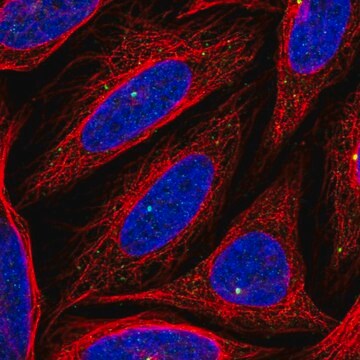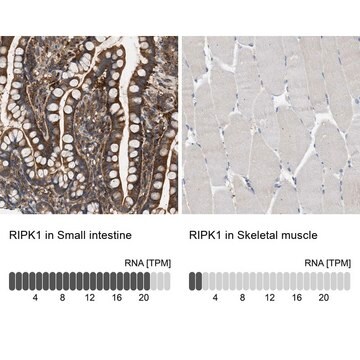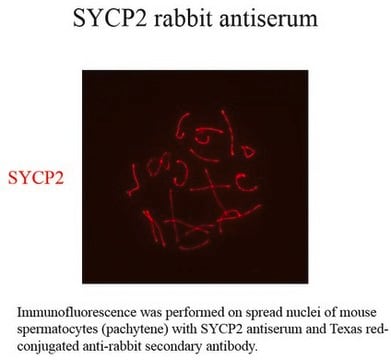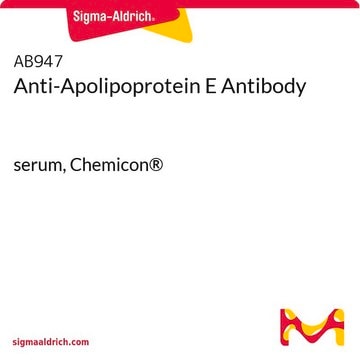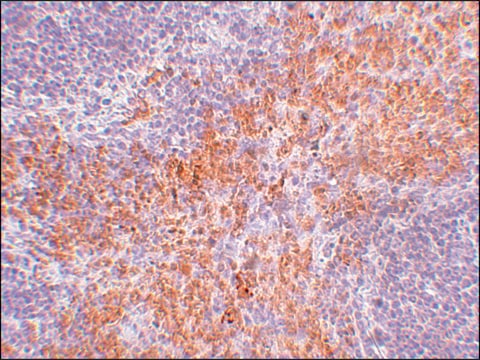ABE2621
Anti-CEP164
from rabbit
Synonym(s):
Centrosomal protein of 164 kDa
Sign Into View Organizational & Contract Pricing
All Photos(1)
About This Item
UNSPSC Code:
12352203
eCl@ss:
32160702
NACRES:
NA.41
Recommended Products
biological source
rabbit
Quality Level
antibody form
purified antibody
antibody product type
primary antibodies
clone
polyclonal
species reactivity
human
technique(s)
immunocytochemistry: suitable
western blot: suitable
isotype
IgG
NCBI accession no.
UniProt accession no.
shipped in
ambient
target post-translational modification
unmodified
Gene Information
human ... CEP164(22897)
General description
Centrosomal protein of 164 kDa (UniProt: Q9UPV0; also known as Cep164) is encoded by the CEP164 (also known as KIAA1052, NPHP15) gene (Gene ID: 22897) in human. Cep164 is expressed in several cell lines and it plays a role in microtubule organization and/or maintenance for the formation of primary cilia (PC), a microtubule-based structure that protrudes from the surface of epithelial cells. Cep164 localizes specifically to very distally located appendage structures on the mature centriole from which PC formation originates and it persists at centrioles throughout mitosis. Hence, it can serve as a marker for distal appendages on mature centrioles or basal bodies. Cep164 also plays a vital role in G2/M checkpoint and nuclear divisions. It is a key participant in the DNA damage-activated ATR/ATM signaling cascade and is required for the proper phosphorylation of H2AX, replication protein A, and check point kinases 1 and 2. Its phosphorylation at Ser186 is induced upon DNA-damage caused by treatment with IR irradiation, UV irradiation, hydroxyurea or amphidicolin. Mutations in CEP164 gene are known to cause nephronophthisis, a disease characterized by blindness in childhood, facial dysmorphism, bronchieclasis, liver failure and progression to end-stage renal failure.
Specificity
This polyclonal antibody detects Centrosomal protein of 164 kDa in human. It targets an epitope within the first 298 amino acids from the N-terminal region.
Immunogen
Epitope: N-terminus
His-taggged recombinant fragment of the first 298 amino acids from human Centrosomal protein of 164 kDa (CEP164).
Application
Anti-CEP164, Cat. No. ABE2621, is a highly specific rabbit polyclonal antibody that targets Centrosomal protein of 164 kDa and has been tested in Immunocytochemistry and Western Blotting.
Immunocytochemistry Analysis: A representative lot detected CEP164 in U2OS cells and hTERT-RPE1 cells that were serum starved for 48 hours (Graser, S., et. al. (2007). J Cell Biol. 179(2):321-30; Sonnen, K.F., et. al. (2012). Biol Open. 1(10):965-76).
Western Blotting Analysis: A representative lot detected CEP164 in total lysates of HeLa S3, U2OS, and 293T cells as well as 293T cells overexpressing myc-Cep164 (Graser, S., et. al. (2007). J Cell Biol. 179(2):321-30).
Western Blotting Analysis: A representative lot detected CEP164 in total lysates of HeLa S3, U2OS, and 293T cells as well as 293T cells overexpressing myc-Cep164 (Graser, S., et. al. (2007). J Cell Biol. 179(2):321-30).
Research Category
Epigenetics & Nuclear Function
Epigenetics & Nuclear Function
Quality
Evaluated by Western Blotting in U2OS cell lysate.
Western Blotting Analysis: A 1:500 dilution of this antibody detected CEP164 in 10 µg of U2OS cell lysate.
Western Blotting Analysis: A 1:500 dilution of this antibody detected CEP164 in 10 µg of U2OS cell lysate.
Target description
~200 kDa observed; 164.31 kDa calculated. Uncharacterized bands may be observed in some lysate(s).
Physical form
Format: Purified
Protein A purified
Purified rabbit polyclonal antibody in buffer containing 0.1 M Tris-Glycine (pH 7.4), 150 mM NaCl with 0.05% sodium azide.
Storage and Stability
Stable for 1 year at 2-8°C from date of receipt.
Other Notes
Concentration: Please refer to lot specific datasheet.
Disclaimer
Unless otherwise stated in our catalog or other company documentation accompanying the product(s), our products are intended for research use only and are not to be used for any other purpose, which includes but is not limited to, unauthorized commercial uses, in vitro diagnostic uses, ex vivo or in vivo therapeutic uses or any type of consumption or application to humans or animals.
Not finding the right product?
Try our Product Selector Tool.
Storage Class Code
12 - Non Combustible Liquids
WGK
WGK 1
Certificates of Analysis (COA)
Search for Certificates of Analysis (COA) by entering the products Lot/Batch Number. Lot and Batch Numbers can be found on a product’s label following the words ‘Lot’ or ‘Batch’.
Already Own This Product?
Find documentation for the products that you have recently purchased in the Document Library.
Phillip Scott et al.
The Journal of cell biology, 222(12) (2023-09-29)
Polo-like kinase 4 (PLK4) is a key regulator of centriole biogenesis, but how PLK4 selects a single site for procentriole assembly remains unclear. Using ultrastructure expansion microscopy, we show that PLK4 localizes to discrete sites along the wall of parent
Thao P Phan et al.
Genes & development, 36(11-12), 718-736 (2022-07-01)
Centrosomes are microtubule-organizing centers comprised of a pair of centrioles and the surrounding pericentriolar material. Abnormalities in centriole number are associated with cell division errors and can contribute to diseases such as cancer. Centriole duplication is limited to once per
Olivier Mercey et al.
Nature cell biology, 21(12), 1544-1552 (2019-12-04)
Multiciliated cells (MCCs) amplify large numbers of centrioles that convert into basal bodies, which are required for producing multiple motile cilia. Most centrioles amplified by MCCs grow on the surface of organelles called deuterosomes, whereas a smaller number grow through
Our team of scientists has experience in all areas of research including Life Science, Material Science, Chemical Synthesis, Chromatography, Analytical and many others.
Contact Technical Service